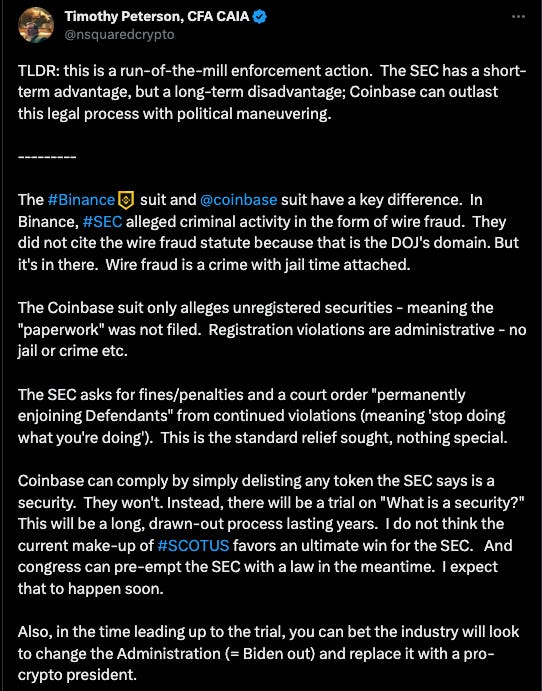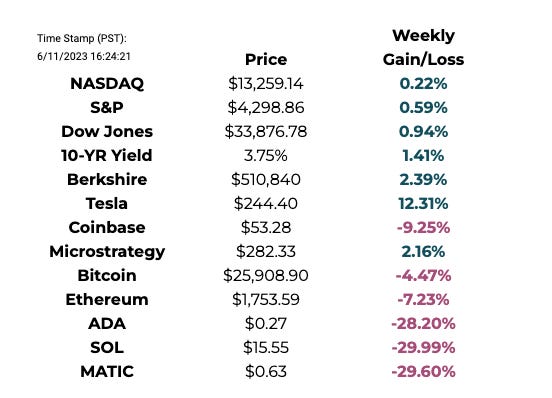Everything You Need to Know About the Regulatory War On Crypto
Dear Investors,
It has been a tumultuous week as both Binance and Coinbase faced legal actions from the SEC and the CFTC, while the possibility of further action from the DOJ remains imminent.
“King Gensler.” Source: Crypto A.M.
Before we dive, let’s do a quick review of what these agencies actually do.
SEC:
The SEC refers to the U.S. Securities and Exchange Commission, established in 1934, is an independent regulatory agency of the United States federal government. The SEC's primary mandate is to enforce federal securities laws, protect investors, and maintain the fair and orderly functioning of the securities markets.
The SEC claims that it plays a “crucial role” in maintaining investor confidence in the securities markets and promoting capital formation. It regulates various financial securities, including stocks, bonds, mutual funds, exchange-traded funds (ETFs), and certain digital assets, to ensure transparency, accountability, and protection for investors and the public.
In 2018, the SEC stated that Bitcoin and Ethereum are not considered securities, but rather decentralized digital currencies. Most recently, thought leaders have argued that Ethereum could be deemed a security since switching to the “Proof-of-Stake” mechanism, which is akin to other alt-coins.
SEC enforcement actions related to cryptocurrencies experienced a significant surge, increasing by an impressive 183% in the six months following FTX's bankruptcy.
CFTC:
The CFTC, or Commodity Futures Trading Commission, established in 1974, primarily aims to oversee and regulate the derivatives markets in the U.S. As part of its mandate, it also regulates the trading of commodities. This includes agricultural commodities, energy resources, metals, and other physical goods that are traded in futures markets. The CFTC sets rules and regulations to ensure fair and transparent trading practices, prevent manipulation and fraud, and protect market participants in the commodities markets.
In 2015, the CFTC declared virtual currencies, including Bitcoin, as commodities under the Commodity Exchange Act (CEA). This means that the CFTC has the power to regulate Bitcoin futures and other derivative products tied to cryptocurrencies. However, it's important to note that the CFTC's jurisdiction primarily extends to derivatives, not the underlying spot market for cryptocurrencies.
DOJ:
The DOJ, the U.S. Department of Justice, is a federal executive department in the United States government, headed by the Attorney General. The DOJ is responsible for enforcing federal laws, representing the government in legal matters, and administering the federal justice system.
The DOJ is organized into various divisions and agencies, including the Federal Bureau of Investigation (FBI), the Drug Enforcement Administration (DEA), the Bureau of Alcohol, Tobacco, Firearms, and Explosives (ATF), and the U.S. Marshals Service, among others. It plays a vital role in maintaining law and order, combating organized crime, protecting civil rights, and ensuring the fair and impartial administration of justice at the federal level.
It is worth noting that both the SEC and CFTC engage in civil charges, with criminal charges administered by the DOJ. The main difference is that DOJ violations can land you in jail, while the SEC and CFTC can give you a fine and close your business.
Binance and Coinbase Charged by the SEC and CFTC
The U.S. Securities and Exchange Commission (SEC) has launched a fresh wave of lawsuits targeting Binance and Coinbase. On June 5, the SEC filed 13 charges against Binance, accusing the exchange of engaging in unregistered token offerings and sales, as well as failing to register as an exchange or broker-dealer. In response to these legal actions, trading volume on major decentralized exchanges witnessed a staggering 444% surge in just a few hours.
At the heart of the charges is the question of whether Coinbase and Binance are operating as unregulated securities exchanges, granting access to assets that are considered de-facto securities.
The SEC has expanded the list of cryptocurrencies categorized as "securities," bringing the total count to an estimated 67. In the Binance case, the SEC designated 10 cryptocurrencies as securities (SOL, ADA, MATIC, FIL, ATOM, SAND, MANA, ALGO, AXS and COTI), while the Coinbase suit involved 13 cryptocurrencies. With this classification, the "security" label now encompasses over $100 billion worth of the market, accounting for approximately 10% of the total crypto market capitalization of $1.09 trillion.
Coinbase CEO Brian Armstrong made headlines when it was revealed that he sold company shares the day prior to the SEC's lawsuit against the exchange, avoiding significant losses. According to SEC records, Armstrong sold 29,730 shares of Coinbase on June 5, just before the SEC filed its lawsuit. It's worth noting that Armstrong has been regularly selling Coinbase stock since November as part of a pre-determined 10b5-1 plan adopted in August, which establishes the timing and size of transactions in advance.
The lawsuits have taken a toll on the net worth of both Armstrong and Binance CEO Changpeng Zhao. Within a span of 30 hours, Armstrong's net worth dropped by $289 million, while Zhao's experienced a significant decline of $1.33 billion.
Binance.US has temporarily halted U.S. dollar deposits and announced an upcoming suspension of fiat withdrawals starting as early as June 13. The exchange attributes these actions to what it describes as "extremely aggressive and intimidating tactics" from American regulators. However, trading, staking, and crypto-related deposits and withdrawals remain fully operational. Binance.US has also made the decision to delist eight Bitcoin pairs and two BUSD pairs, while temporarily pausing its OTC Trading Portal services.
On June 7, the United States district court in Washington, D.C., issued a summons for Binance CEO Changpeng Zhao, merely two days after the Securities and Exchange Commission (SEC) officially filed a lawsuit against the exchange, alleging unregistered securities operations. In court filings, it was revealed that Binance US suffered a loss of $181 million in 2022.
The SEC is seeking a restraining order to freeze Binance US assets, while Binance has expressed its preparedness to fight the SEC's allegations "to the full extent of the law." Furthermore, the SEC claims that Binance commingled billions of dollars in customer funds with a third-party entity owned by CEO Changpeng Zhao.
Sec Files Lesser Charges Against Coinbase
The SEC has intensified its scrutiny of Coinbase by filing a lawsuit alleging that the exchange has acted as an unregistered broker and facilitated the trading of crypto asset securities unlawfully, resulting in billions of dollars in revenue. Coinbase's CEO has expressed confidence in fighting the SEC's allegations in court. Coinbase argues that it provided detailed disclosure of its business operations during its IPO filing, which was approved by the SEC. In response to the SEC's lawsuit, ten states have taken legal action against Coinbase, accusing the company of violating securities regulations related to its staking offerings. These states include Alabama, California, Illinois, Kentucky, Maryland, New Jersey, South Carolina, Vermont, Washington, and Wisconsin.
But many industry insiders believe Coinbase can win this battle.
What’s Gensler’s Problem?
SEC Chair Gary Gensler has faced criticism for appearing to align his political agenda with Senator Warren, especially after facing backlash for not taking action against FTX earlier. Gensler's recent comments have characterized the entire crypto industry as being filled with "hucksters, fraudsters, scam artists."
During an interview, Gensler expressed his view against the need for more digital currencies, displaying a pro-fiat stance. Interestingly, court filings indicate that Gensler applied to serve as an advisor for Binance in 2019 before assuming the role of SEC Chair.
A video from four years ago featuring Gensler praising the smart contract platform Algorand has resurfaced on Twitter. This comes after the SEC declared that ALGO, the native token of Algorand, is an unregistered security. In the video, Gensler acknowledged Algorand as a "great technology" and contemplated its potential to integrate applications similar to Uber or Lyft on its high-performance smart contract network.
A DOJ Indictment Against Binance is Likely
Bellow is a helpful explanatory tweet that discusses the fundamental charges and outlines the reasons why the involvement of the DOJ is probable. (Source tweet).
Congress Reviews Crypto Bill
Meanwhile, earlier this month, Republican lawmakers introduced a draft bill aimed at providing clearer regulatory guidelines for crypto assets and exchanges in the United States. The proposed legislation, co-authored by Reps. Patrick McHenry and Glenn Thompson, would assign regulatory authority over crypto commodities to the Commodity Futures Trading Commission (CFTC) for spot market oversight. The Securities and Exchange Commission (SEC) would be responsible for regulating digital-asset securities. The bill also seeks to enable alternative trading systems to list crypto securities and calls for the SEC to modify rules allowing broker-dealers to custody digital assets. The proposed legislation aims to establish a pathway for registered offers and sales of digital assets while providing exemptions for decentralized finance (DeFi) assets. The draft bill is subject to potential revisions but demonstrates support from influential Republican members.
If passed, the bill could override some of the claims the SEC is currently making against Coinbase and other exchanges.
A summary of the bill is available here.
Ripple case more crucial than ever
The judges overseeing the lawsuits involving Coinbase and Binance are expected to closely observe the outcome of the SEC v Ripple case which should be coming to an end shortly. Ripple has been engaged in a legal dispute with the SEC since December 2020, as the regulator accuses Ripple of offering unregistered securities through XRP since 2013. However, the lawyers caution that despite the Ripple case's significance, any ruling would not serve as a binding precedent for the Coinbase and Binance lawsuits. Only decisions made by the Court of Appeals and the Supreme Court hold that level of influence on future rulings.
This Week By the Numbers 📈
The Federal Reserve is anticipated to pause its interest rate increases at its upcoming meeting on June 13-14, breaking a trend of continuous rate hikes that has lasted over a year. The central bank has implemented several significant tightening measures, resulting in a total increase of 500 basis points since March 2022. While the majority of economists predict that the Federal Open Market Committee will maintain the federal funds rate at 5.00%-5.25% after the meeting, a minority expects the possibility of at least one more hike this year due to the strong performance of the US economy.
Alt-coins have taken a hit across the board in the crypto markets, with BTC and ETH continuing to hold strong.
Top Stories 🗞️
Crypto.com suspends US institutional exchange service
Crypto.com will no longer serve institutional clients in the United States after announcing the suspension of the service starting June 21. The Singapore-based cryptocurrency exchange cited limited demand from institutional customers as a primary reason for the move, which has been exacerbated by testing prevailing market conditions. A statement from Crypto.com noted that the platform’s institutional users were given advance notice of the decision to suspend the service. Crypto.com’s retail mobile application and platform remains fully operational in the United States.
Tokens delisted, exchange closed following SEC crypto lawsuits
The popular stock trading app Robinhood announced(opens in a new tab) on Friday that the company would be delisting all of the cryptocurrency tokens that trade on its platform that the SEC classified as unregistered securities. According to Robinhood, it will end support for the crypto tokens Cardano (ADA), Polygon (MATIC), and Solana (SOL) after June 27. Users can buy and sell these tokens until then, and can transfer these tokens to other crypto wallets as well. However, after that date, any account holding Cardano, Polygon, or Solana in their Robinhood account will automatically sell the tokens and be credited with the funds.
Sequoia splits China and India arms from US mothership to avoid ‘portfolio conflict’ and ‘market confusion’
Sequoia plans to split into three entities — Sequoia Capital in the U.S. and Europe, Peak XV Partners in India and Southeast Asia, and HongShan in China — as the storied venture firm separates the Asia units from the mothership as it navigates an increasingly complex geopolitical landscape. The split — which will go into effect by March next year — comes amid the growing geopolitical tension between China and the U.S., the world’s two largest economies. The India and Southeast Asia unit, on the other hand, confronted some optics and governance issues at its portfolio firms last year. In a letter to its limited partners, Sequoia downplayed why it was splitting up. “It has become increasingly complex to run a decentralized global investment business,” the firm’s regional leaders Roelof Botha, Neil Shen and Shailendra Singh wrote in a blog post.
PGA Tour-LIV Golf merger 'disruptive’ for the sports industry
In a surprise announcement on Tuesday, the PGA Tour, DP World Tour and the Saudi Public Investment Fund (PIF), which backs LIV Golf, revealed they would come together to establish a new entity – currently unnamed. The announcement of the deal to "unify the game of golf, on a global basis" comes nearly 15 months after LIV Golf unveiled its first series and about a year after its first tournament. The PGA Tour, DP World Tour and PIF said in their news release that the new entity would have an exclusive investor, the Saudi sovereign wealth fund, plus the three leagues at the beginning. The PIF has Saudi Crown Prince Mohammed bin Salman Al Saud as its chairman and Yasir Al-Rumayyan as its governor, along with about $620 billion assets under management.
Thank you for reading this week’s edition of the Myth of Money.🚀
Until next week,
Tatiana Koffman
About the Author: Tatiana Koffman
Hi there and thanks for reading! If you stumble upon my newsletter, you will notice that I write about money, economics, and technology. I hold a JD/MBA and spent my career in Capital Markets working across Mergers & Acquisitions, Derivatives, Venture Capital, and Cryptocurrencies. I write to make financial topics more accessible and create equal opportunity for the next generation of investors. I have personally invested in 20+ companies and funds (👉 my portfolio).










